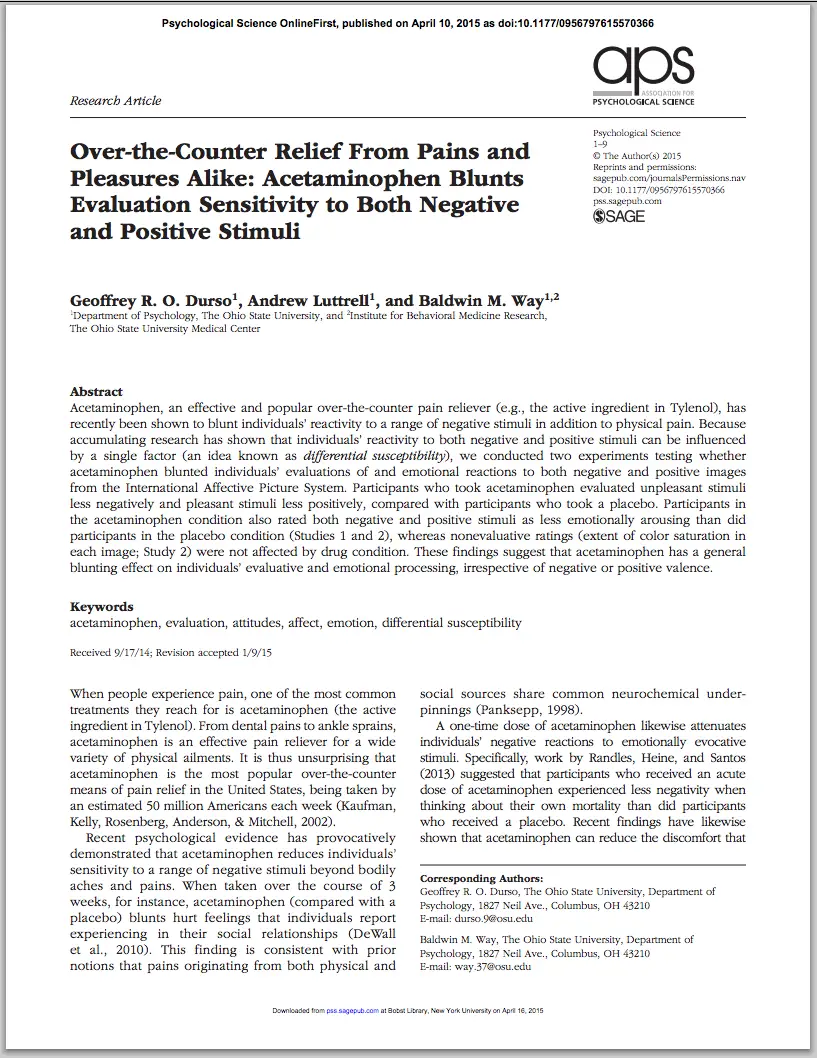By Sayer Ji
Contributing Writer for Wake Up World
For decades Tylenol has been used as a pain-killer, but new research reveals it has psychiatric side effects including dulled emotional responses to both positive and negative stimuli.
The public is beginning to understand that many over-the-counter painkillers do more than just kill pain, but sometimes kill those taking them.
[pro_ad_display_adzone id=”110028″]
For instance, A 2013 review of 754 clinical trials published in Lancet found that NSAID use was associated with roughly double the heart failure risk. Ibuprofen, in particular, has been estimated to cause thousands to die of cardiovascular events each year, and according to the lead researcher of the Lancet review, equally as dangerous for long-term users as the drug Vioxx which was estimated to cause 30,000 excess heart attacks and sudden cardiac deaths between 1999-2003 alone.
Popular over-the-counter painkillers include acetaminophen (Tylenol) , ibuprofen, napoxen (Alleve) and aspirin, and many pop them like candy to reduce pain and inflammation without ever looking to identify and resolve the root causes of their symptoms.
Now, a new study finds that not only does the Tylenol affect the body, but it also dulls the emotional responses of users as well.
The groundbreaking new study published in the journal Psychology Science titled, “Over-the-Counter Relief From Pains and Pleasures Alike: Acetaminophen Blunts Evaluation Sensitivity to Both Negative and Positive Stimuli“, found that:
“Participants who took acetaminophen evaluated unpleasant stimuli less negatively and pleasant stimuli less positively, compared with participants who took a placebo.”
In the study, participants were randomly assigned to take either an acute dose of 1,000 mg of acetaminophen or a placebo, both in a liquid form. As a double-blind study, neither the experimenters nor the participants were aware of which they received. After a 60-minute waiting period to allow the Tylenol to enter their brain, participants were shown pictures depicting positive and negative events to ascertain the intensity of their responses.
The researchers discussed the implications of their findings:
“Across two studies, we demonstrated that acetaminophen attenuates individuals’ evaluations and emotional reactions to negative and positive stimuli alike. These results build on recent psychological research illustrating that acetaminophen can blunt the intensity with which individuals experience negative events that originate from physical, social, or cognitive sources (DeWall et al., 2015; DeWall et al., 2010; Randles et al., 2013). Further, these findings expand on the research to date to show that acetaminophen blunts positive evaluations in like fashion.”
They noted that their research has significant implications for Tylenol’s psychotropic properties:
“That a drug purported to relieve negative evaluations of pain also reduces positive evaluations of pleasant stimuli suggests the existence of a common evaluative psychological process that influences a wide range of thoughts and behaviors. This might mean, for instance, that certain methods designed to specifically alter individuals’ reactivity to negative stimuli (e.g., treatment of phobias) could, if too broadly applied, potentially change their sensitivity to emotionally evocative stimuli more generally, including positive events (e.g., causing them to feel less joy at a wedding). It is interesting that such diminished evaluation sensitivity could also presumably cause people to feel less conflicted, indecisive, or uncomfortable when they experience ambivalence toward individuals or experiences that elicit both negative and positive reactions (e.g., Priester & Petty, 1996; Rydell & Durso, 2012).”
Clearly, this study opens up a disturbing possibility that commonly used pain-killers, work both physically and emotionally, to blunt the intensity of both physical and psychological experiences. Were these drugs safe, and not causing thousands of deaths a year, perhaps this ‘side effect’ could be considered justifiable. But considering that they do indeed have lethal side effects, it is important for consumers to know that they also may come with psychiatric ones. Considering it took the FDA 32 years after its own expert panel told the agency in 1977 that it was “obligatory” to put on the warning label of Tylenol products that it caused “severe liver damage,” we are doubtful that this information will be disseminated widely any time soon. For more information on the dangers of Tylenol, read the recent ProPublica expose titled, “Use Only As Directed,” or review our Tylenol and NSAID databases for hundreds of articles linking these drugs to dozens of serious health problems. Also, for those looking for natural alternatives, you can review the following articles on the topic:
- The Powerful Aspirin Alternative That Grows On Trees
- The Evidence Against Aspirin And For Natural Alternatives
- Ibuprofen Kills Thousands Each Year, So What Is The Alternative?
- Turmeric Beats Ibuprofen for Arthritis of the Knee
- Thyme Oil Beats Ibuprofen for Relieving Menstruation Pain
- Eating Sesame Seeds Superior To Tylenol for Knee Arthritis
- Painkillers that Kill: Tylenol and the Silent Epidemic
- Turmeric Extract Puts Drugs For Knee Osteoarthritis To Shame
Further articles by Sayer Ji:
- Yoga’s Age-Defying Effects Confirmed by Science
- Turmeric’s ‘Smart Kill’ Properties Put Chemo & Radiation To Shame
- 6 Evidence-Based Ways Drumming Heals Body, Mind and Soul
- Research: Plants Cure Cancer, Not Chemicals
- A Higher Level of Freedom – The Benefit of Cannabis to Health
- Amazing Discovery: Plant Blood Enables Your Cells To Capture Sunlight Energy
- Fluoridated Water Can Calcify Arteries, Study Finds
- Research Proving Vitamin C’s Therapeutic Value in 200+ Diseases
- Biophotons: The Human Body Emits, Communicates with, and is Made from Light
- 13 Evidence-Based Medicinal Properties of Coconut Oil
About the author:
Sayer Ji is an author, educator, Steering Committee Member of the Global GMO-Free Coalition (GGFC), advisory board member of the National Health Federation, and the founder of GreenMedInfo.com – an open access, evidence-based resource supporting natural and integrative modalities. His writings have been published and referenced widely in print and online, including Truthout, Mercola.com, The Journal of Gluten Sensitivity, New York Times and The Well Being Journal.
In 1995 Sayer received a BA degree in Philosophy from Rutgers University, where he studied under the American philosopher Dr. Bruce W. Wilshire, with a focus on the philosophy of science. In 1996, following residency at the Zen Mountain Monastery in upstate New York, he embarked on a 5 year journey of service as a counsellor-teacher and wilderness therapy specialist for various organizations that serve underprivileged and/or adjudicated populations. Since 2003, Sayer has served as a patient advocate and an educator and consultant for the natural health and wellness field.
Visit GreenMedInfo online and on Facebook, or sign up for GreenMedInfo’s e-Newsletter.
[pro_ad_display_adzone id=”110027″]









